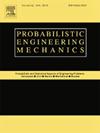Confidence-based design optimization using multivariate kernel density estimation under insufficient input data
IF 3.5
3区 工程技术
Q2 ENGINEERING, MECHANICAL
引用次数: 0
Abstract
The uncertainty quantification of the input statistical model in reliability-based design optimization (RBDO) has been widely investigated for accurate reliability analysis, and it could be estimated through its characteristics, cumulative experiences, and available data. However, uncertainty quantification of random variables in existing RBDO studies has exploited parametric distributions quantifying the uncertainty through the Bayes' theorem. In addition, a correlation between random variables is often underestimated due to a lack of knowledge and difficulty to describe the high-dimensional correlation. Hence, it has been a challenge to properly quantify input statistical model and its uncertainty. Therefore, a multivariate kernel density estimation (KDE) is employed to perform data-driven confidence-based design optimization (CBDO) for effective quantification of input model uncertainty. Any assumption on input distribution is not necessary since it is established only with the given input data. Moreover, the input model uncertainty due to insufficient data is quantified using bootstrapping and optimal adaptive bandwidth matrices through the Bayes’ theorem using cross-validation error. Consequently, the proposed CBDO with given input data is capable of finding a conservative optimum of RBDO accounting for both aleatory uncertainty of random variables and epistemic uncertainty induced by a limited number of input data through the multivariate KDE.
在输入数据不足的情况下,利用多变量核密度估计进行基于置信度的设计优化
为进行精确的可靠性分析,基于可靠性的设计优化(RBDO)中输入统计模型的不确定性量化已被广泛研究,可通过其特征、累积经验和可用数据对其进行估计。然而,在现有的 RBDO 研究中,随机变量的不确定性量化都是利用参数分布,通过贝叶斯定理量化不确定性。此外,由于缺乏知识和难以描述高维相关性,随机变量之间的相关性往往被低估。因此,如何正确量化输入统计模型及其不确定性一直是个难题。因此,我们采用了多元核密度估计(KDE)来执行数据驱动的基于置信度的设计优化(CBDO),以有效量化输入模型的不确定性。由于只需根据给定的输入数据即可建立输入分布,因此无需对输入分布进行任何假设。此外,数据不足导致的输入模型不确定性可通过贝叶斯定理使用交叉验证误差进行引导和最优自适应带宽矩阵量化。因此,所提出的具有给定输入数据的 CBDO 能够找到 RBDO 的保守最优值,既考虑到随机变量的可知不确定性,也考虑到通过多元 KDE 由有限的输入数据引起的可知不确定性。
本文章由计算机程序翻译,如有差异,请以英文原文为准。
求助全文
约1分钟内获得全文
求助全文
来源期刊

Probabilistic Engineering Mechanics
工程技术-工程:机械
CiteScore
3.80
自引率
15.40%
发文量
98
审稿时长
13.5 months
期刊介绍:
This journal provides a forum for scholarly work dealing primarily with probabilistic and statistical approaches to contemporary solid/structural and fluid mechanics problems encountered in diverse technical disciplines such as aerospace, civil, marine, mechanical, and nuclear engineering. The journal aims to maintain a healthy balance between general solution techniques and problem-specific results, encouraging a fruitful exchange of ideas among disparate engineering specialities.
 求助内容:
求助内容: 应助结果提醒方式:
应助结果提醒方式:


